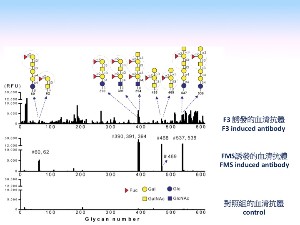The lingzhi mushroom, or referred to as reishi mushroom in Japan, has been used as a medicinal mushroom in traditional Chinese medicine for more than 2,000 years, many believe it as a regulator to human immune system as well as its potential in treating cancers. Years of studies have pinpointed the complex polysaccharides in Lingzhi as the main ingredient that has the therapeutic effect, however, the exact mechanism has been a mystery until just now, when the team from Genomics Research Center has published the paper “Immunization of fucose-containing polysaccharides from Reishi mushroom induces antibodies to tumor-associated Globo H-series epitopes” on the August 20 PNAS Journal.
The team that focuses on the Lingzhi study has been pursuing the fact for years. They are aimed to find out the truth behind the centuries old medicinal treatment. Previously, a glycan extract named as F3 from Lingzhi has been proved effective in triggering various immune responses, boosting the activity of the nature killer cells in destroying cancerous cells.
The latest finding has been an exciting breakthrough! The team has further demonstrated successfully how after injecting the polysaccharides extracted from Lingzhi into mice, it can induce antibodies to recognize tumor-associated carbohydrate antigens on cancer cells and actually kill the cancer cells.
As a matter of fact, this result is quite a come together of several prior studies, they just all fit!
First of all, Dr.Hsien-Yeh Hsu of National Yang-Ming University has a well established animal model in the study of F3. By injecting F3 into mice with lung cancer tumor, they have observed significant decreasing in the tumor growth rate, however, any given immunology knowledge were not enough in explaining the mechanism.
Since Dr. Chi-huey Wong and Dr. Chung-yi Wu have successfully demonstrated the sugar vaccines development platform, where they use special glycans from cancer cell surfaces as antigen, and then, let the immume system produce antibodies to fight off cancerous cells. Therefore, the team started pounding on a new strategy, they wanted to see if by using F3 as the antigen, is it possible to induce any anti-cancer antibodies.
Wong and Wu have a unique inspection tool - the sugar chip. On a single sugar chip, they managed to arrange a array of 30 different glycan antigens, along with othre various sugar moleculars. They can use this tool to see if the blood from F3 injected mouse carry any antibody that will bind with any of the known antigens.
To their surprise, Globo H stood out again. Globo H has been one of the study focuses for cancer treatment to this team. Globo H is a special sugar molecule found particular bountiful on cancerous cell surfaces. Further examination with mice treated with different amount of F3 has drew the conclsion that, the more the Globo H recognizing anitibodies identified in a mouse, the smaller the tumor.
 Antibodies much focused and in larger quantity induced by FMSFurther, a fucose enriched fraction called FMS within F3 was identified. For years, people have been trying to finding the really critical part in Lingzhi, sort of looking for the magical leaf in a big tree. The team proved that the FMS molecule can induce even more anti-Globo H antibodies and, thus, more effectively inhibiting tumor growth. On the other hand, they have also demonstrated that, without any fucose residue, Lingzhi will have no effect in treating cancerous cells.
Antibodies much focused and in larger quantity induced by FMSFurther, a fucose enriched fraction called FMS within F3 was identified. For years, people have been trying to finding the really critical part in Lingzhi, sort of looking for the magical leaf in a big tree. The team proved that the FMS molecule can induce even more anti-Globo H antibodies and, thus, more effectively inhibiting tumor growth. On the other hand, they have also demonstrated that, without any fucose residue, Lingzhi will have no effect in treating cancerous cells.
Dr. Kuo-I Lin’s of Genomics Research Center is an expert in Immunology. She identified that it is the B cell which recognizes the F3 or FMS as antigen. The immunocyte B1 would produce antibody IgM, which then go find Globo H and other cancer related glycans in protecting the body.
Finally, with the assistance of Dr. Khoo, Kay-Hooi, a researcher of Institute of Biochemistry, a mass spectrometry analysis was carried out. Dr. Khoo has unfold the effective structures of the fucose-containing saccharides successfully.
The puzzle of Lingzhi thus has been resolved.
The first authors of this research paper are shared by Ph.D. student Liao, Shih-Fen of the Institute of Biochemical Sciences, National Taiwan University, and Dr. Liang, Chi-Hui of the Genomics Research Center, Academia Sinica.
The related article and a digest can be retrieved in the following links:
“Immunization of fucose-containing polysaccharides from Reishi mushroom induces antibodies against tumor-associated Globo H-series epitopes,” Proc. Nat. Acad. Sci. U.S.A., 110(34):13809-14, (2013).
http://www.pnas.org/content/110/34/13809.full.pdf
http://www.pnas.org/content/110/34/13693.full.pdf